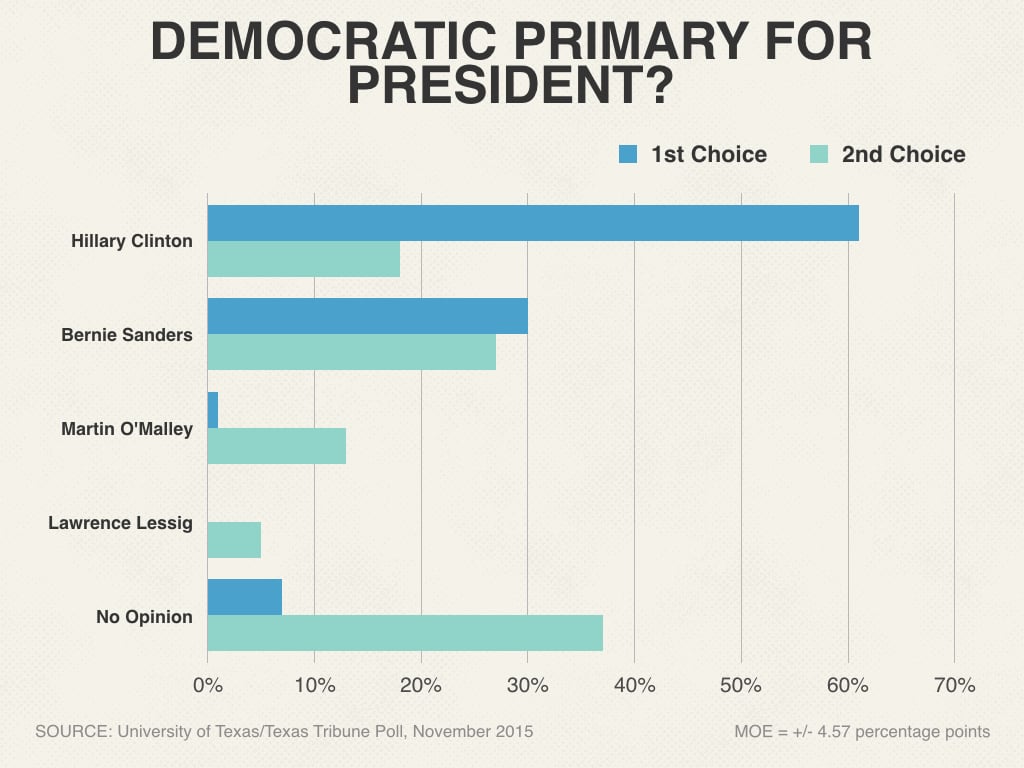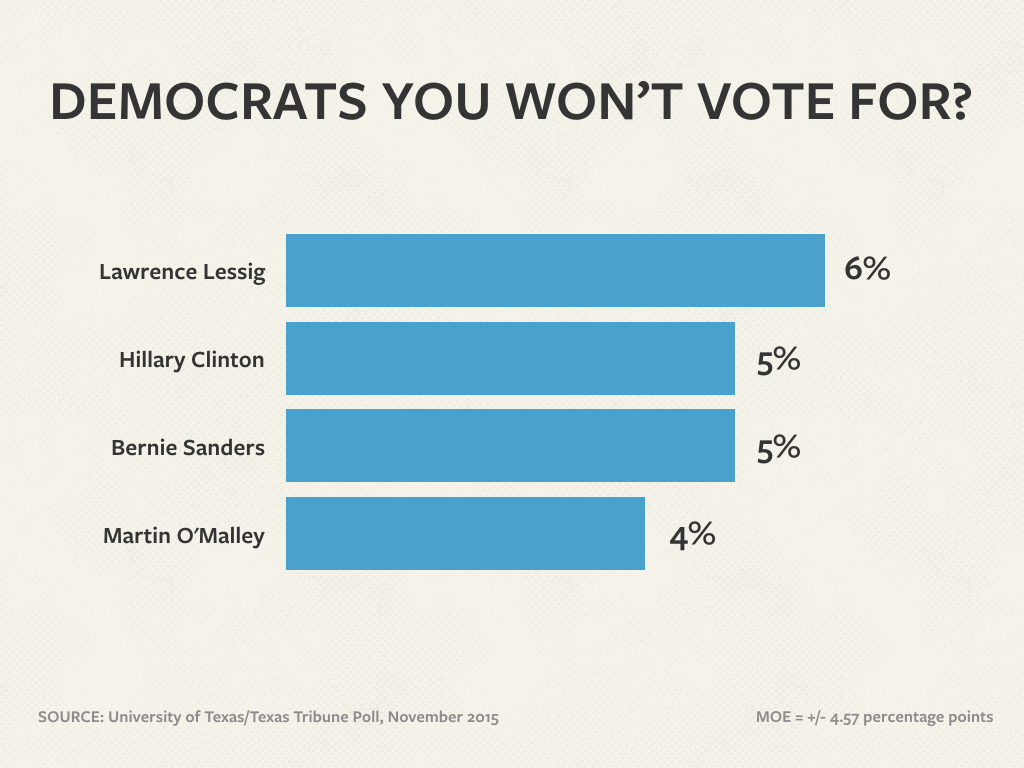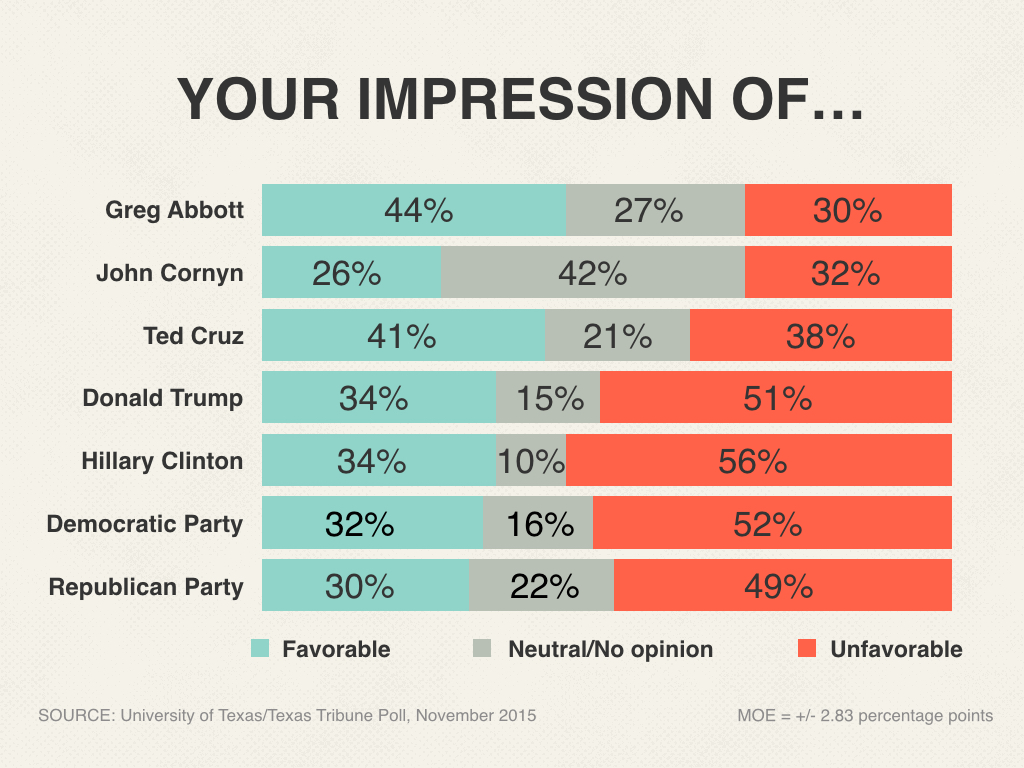UT/TT Poll: Cruz, Trump in Dead Heat in Texas; Clinton Well Ahead
/https://static.texastribune.org/media/images/2015/11/11/UT-TT-Polls-102714C.jpeg)
U.S. Sen. Ted Cruz and businessman Donald Trump are in a dead heat for the Republican presidential nomination in Texas, according to the latest University of Texas/Texas Tribune Poll.
With four months to go before the March 1 primary, each had the support of 27 percent of likely Republican voters. Surgeon Ben Carson and U.S. Sen. Marco Rubio of Florida were well back of the leaders at 13 percent and 9 percent, respectively.
Former Secretary of State Hillary Clinton is the first choice of 61 percent of Texas Democrats, building on her earlier support in the state and remaining well ahead of her rivals, U.S. Sen. Bernie Sanders of Vermont and former Maryland Gov. Martin O’Malley. Sanders, running second, has been unable to change the fundamental dynamics of a primary where Clinton has the political advantage, as Barack Obama did in 2008.

“I just don’t see any signs of weakness,” said Daron Shaw, co-director of the poll and a professor of government at the University of Texas at Austin.
Jeb Bush, the scion of the state’s best-known political family and a former governor of Florida, led the list of candidates that Republican voters said they would definitely not support: 25 percent of those voters said they wouldn’t vote for him. Bush was followed closely by U.S. Sen. Lindsey Graham of South Carolina, former New York Gov. George Pataki, New Jersey Gov. Chris Christie and former Virginia Gov. Jim Gilmore.

Trump was tied for sixth with Ohio Gov. John Kasich on that list of undesirables. Cruz was 14th; only Carson, at 7 percent, attracted a smaller number of “nevers” than Cruz.
“Bush is like old calendars — people are just not having it,” said Jim Henson, director of the Texas Politics Project at UT-Austin and the poll’s co-director. He noted that Bush was doing especially poorly with Republicans who identify with the Tea Party — the most active voters in the GOP. “This is the wrong time for Bush,” he said.
Democrats were more amenable to their candidates. Harvard University law professor Lawrence Lessig (6 percent), topped the list of candidates who Democratic voters said they would definitely not support. O’Malley (4 percent), was last; the other two fell in between.

The numbers have shifted some since the previous UT/TT survey in June — a poll conducted when a number of official and unofficial exploratory campaigns were still underway.
Clinton led the Democratic field in the June UT/TT Poll with 53 percent support. Sanders’ numbers increased in the current poll, too, in part because two prospective candidates included in that survey — Vice President Joe Biden and U.S. Sen. Elizabeth Warren of Massachusetts — decided not to run.
The two leading Republican candidates in the latest survey — especially Trump — scooped up support that in June was going to two candidates who have since left the race: former Texas Gov. Rick Perry and Wisconsin Gov. Scott Walker. Cruz had 20 percent in that June poll; Trump was back in the dust at 2 percent.
“The summer of Trump had not started when we did the last poll,” Henson said. “He was not really in the race.”
Good Grades, Bad Grades
Voters were also surveyed for their opinions of several officeholders, political figures and the political parties themselves.
Asked about Texas Gov. Greg Abbott, 44 percent said they had a favorable impression, while 30 percent said they have an unfavorable one. The rest were either undecided or said they have a neutral opinion of the governor. His numbers have been in the same vicinity for a while: 48-29 in June, and 46-28 in the February UT/TT survey.
A striking difference between the ratings of the state’s two U.S. senators can be attributed to Republicans who identify with the Tea Party. Overall, John Cornyn got favorable marks from 26 percent and unfavorable ones from 32 percent; Cruz’s numbers were 41 percent favorable and 38 percent unfavorable. The big difference? Among Tea Party Republicans, 45 percent gave Cornyn unfavorable marks, while only 15 percent of non-Tea Party Republicans rated him poorly. Only 5 percent of the Tea Party group had unfavorable opinions of Cruz, compared with 19 percent of non-Tea Party Republicans.
“The idea that there is an insurgency in the GOP is not a metaphor — it’s a fact,” Henson said about those numbers. “Republicans have a big block of dissidents in their party.”
Overall, fewer voters feel strongly about Cornyn: 42 percent said they were either neutral or had no opinion. Only 20 percent checked that box when rating Cruz.

Trump and Clinton — two polarizing figures in national politics — turn out to be polarizing in Texas, too. Each got favorable marks from 34 percent of the voters. Trump got bad grades from 51 percent, and Clinton from 56 percent. Trump got unfavorable notices from 76 percent of Democrats, from 52 percent of independents and from 32 percent of Republicans. Clinton’s numbers were partisan, too: She got thumbs down from 15 percent of Democrats, 63 percent of independents and 89 percent of Republicans.
The favorable ratings for the two political parties were similar: 30 percent for the Republicans and 32 percent for the Democrats. So were the unfavorable marks: 49 percent for the Republicans and 52 percent for the Democrats.
Some impressions of the parties were somewhat surprising. For instance, 8 percent of voters who identified themselves as Democrats have unfavorable views of the Democratic Party, and 24 percent of self-identified Republicans have unfavorable opinions of the GOP. The disapproval comes from Republicans who identify with the Tea Party, 46 percent of whom have unfavorable impressions of the GOP. Republicans who don’t identify with the Tea Party are happier: Only 12 percent of those have an unfavorable opinion of the party.
The University of Texas/Texas Tribune internet survey of 1,200 registered voters was conducted from Oct. 30 to Nov. 8 and has an overall margin of error of +/- 2.83 percentage points. Among registered voters in Republican primary races, the margin of error is +/- 4.21 percentage points; in Democratic primary races, it is +/- 4.57 percentage points. Numbers in charts might not add up to 100 percent because of rounding.
This is the first of several stories on the latest University of Texas/Texas Tribune Poll. Tomorrow: What Texas voters think about various state and federal officeholders and institutions.
Disclosure: The University of Texas at Austin is a corporate sponsor of The Texas Tribune. A complete list of Tribune donors and sponsors can be viewed here.
Information about the authors
Learn about The Texas Tribune’s policies, including our partnership with The Trust Project to increase transparency in news.
/https://static.texastribune.org/media/profiles/ramsey-ross_TT.jpg)